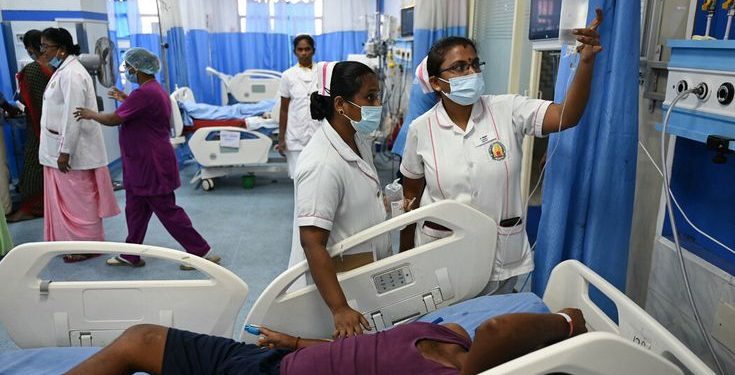Jakarta, Indonesia Sentinel — A resurgence of Guillain-Barré Syndrome (GBS) has been reported in India, affecting hundreds of people since January. A six-year-old boy in Pune, western India, were among the infected after suddenly struggled to write.
According to the BBC, the boy’s father, a schoolteacher, initially assumed his son was simply reluctant to do his homework. He never imagined that his son’s difficulty in holding a pencil was an early sign of GBS, a rare disorder in which the immune system attacks nerve cells, leading to muscle weakness and paralysis.
Within days, the child was admitted to intensive care, unable to move his arms or legs. As his condition deteriorated, he lost the ability to swallow, speak, and eventually breathe, requiring a ventilator. He is currently recovering.
The boy is among approximately 160 reported cases of GBS in Pune, India since early January. There have been five suspected deaths linked to the syndrome. According to official data, currently 48 patients remain in intensive care, 21 are on ventilators, and 38 have been discharged.
Early Symptoms of Guillain-Barré Syndrome
GBS typically begins with tingling or numbness in the hands and feet, followed by muscle weakness and difficulty moving joints. Symptoms worsen over two to four weeks, usually starting in the arms and legs.
The Syndrome reportedly has mortality rates range from 3% to 13%, depending on the severity of the disease and the quality of medical care available.
The GBS outbreak in Pune has been traced to a pathogen called Campylobacter jejuni, a leading cause of foodborne infections and a major trigger of GBS worldwide.
The link between Campylobacter jejuni and GBS was first identified in rural China in the 1990s. The bacteria are commonly found in poultry, and outbreaks of GBS have been observed during rainy seasons when children play in water contaminated with chicken or duck feces.
GBS and Campylobacter
Most GBS cases have been linked to a specific strain of Campylobacter. Experts estimate that roughly one in 100 Campylobacter strains carry the risk of causing GBS, and one in 100 people infected with such a strain develop the syndrome, putting the overall risk at approximately one in 10,000.
“Campylobacter is endemic with hundreds of thousands of cases taking place all the time. It is always existing in the environment,” said Hugh Willison, a professor of neurology at University of Glasgow, as reported by BBC.
When the immune system attacks the bacteria, it may also mistakenly target nerve cells in a process called molecular mimicry, leading to GBS.
Professor Hugh Willison describes this phenomenon as an “immunological Russian roulette,” triggering an “acute neurological tsunami” that impacts the peripheral nervous system. Once the immune response subsides, the attack wanes, but the body requires time, medical care, and rehabilitation to recover.
No Cure for GBS
When an individual experiencing GBS, the body produces antibodies against Campylobacter, which then attack the nervous system. This situations poses challenges for medics to help cure the disease, as medical procedures required complex treatment process.
Doctors often use “plasma exchange,” a procedure that filters the blood to remove harmful antibodies, along with intravenous immunoglobulin (IVIG), a therapeutic antibody treatment, to help reduce the severity of the disease.
Read Also:
Study Finds Dating Apps Linked to Increased Risk of Depression and Mental Health Problem
Another challenge is that there is no definitive test for GBS. Physicians rely on clinical features to diagnose the condition, which can resemble polio, viral infections, or other rare neurological diseases. “Diagnosis is based on a constellation of clinical features. Misdiagnosis, delayed diagnosis, or lack of diagnosis can easily occur,” says Prof. Willison.
Outbreak Spreading
While most GBS cases worldwide stem from undercooked poultry, experts say the infection can also spread through contaminated water, similar to cholera or salmonella.
Contaminated water used for washing or preparing street food can facilitate the spread of the bacteria. In Pune, a strain of Campylobacter with a distinctive molecular feature appears to be circulating, affecting a significant number of people.
According to Forbes, authorities have conducted surveillance on more than 60,000 households, collected 160 water samples for testing, and urged residents to drink boiled water and consume only fresh, properly cooked food while avoiding stale food and undercooked poultry.
However, uneven healthcare infrastructure in India poses a challenge, as doctors in rural areas may struggle to diagnose GBS. The World Health Organization (WHO) has deployed teams to Pune, working alongside federal and state health officials to track, test, and monitor cases while analyzing trends to guide effective treatment strategies.
(Raidi/Agung)


























